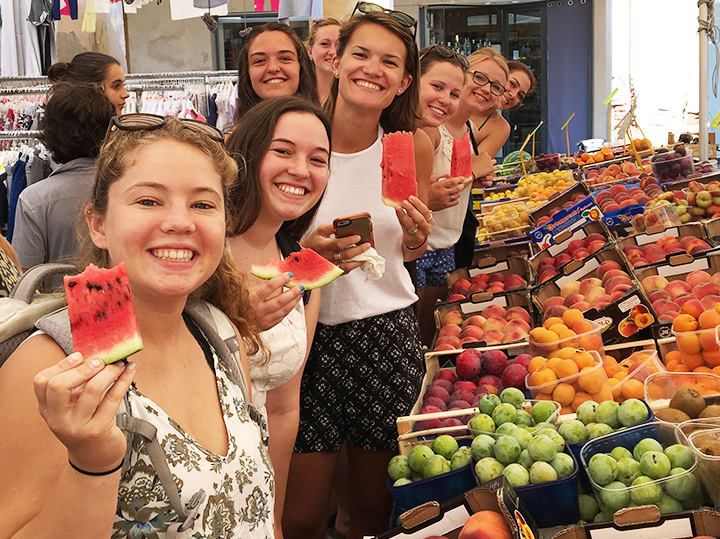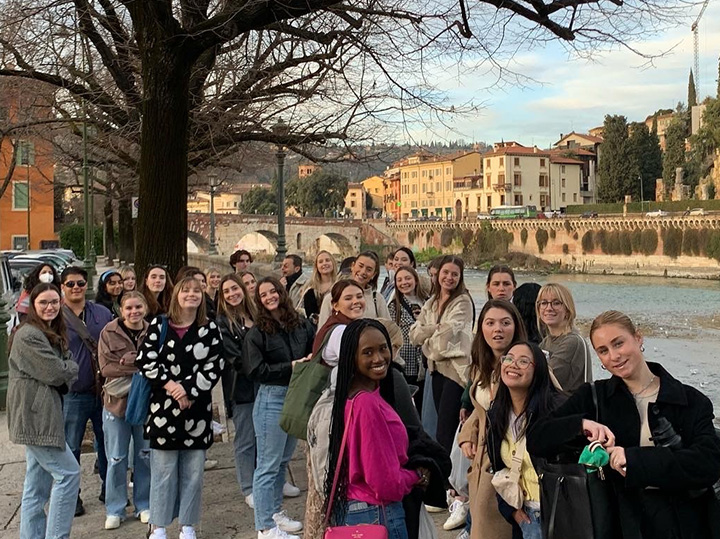Communications, media, and journalism abroad
International experience is valued by employers.
One out of every three employers expect their staff to work with a diverse range of ethnic groups — it’s an essential skill for today’s workforce.
However, only 20% of job applicants show they have cross-cultural experience.
When you study abroad, you stand out to employers.
With USAC, you can stay on track with your degree and give your resume a boost, all while getting the experience of a lifetime. So, what are you waiting for? Discover popular communications-related courses below and get started today.
Stay on track
USAC offers two different program models - Specialty and Partnership. You can choose to align your study abroad experience with your academic needs by browsing popular course subjects and their available program locations, below.
- Specialty Programs are run by an on-site USAC Resident Director (RD) and may include classes with other USAC students.
- Partnership Programs are run by the international programs office and staff at the foreign university.
- Business Communications
- Communications
- Intercultural Communications
- Journalism
- Media Studies
- Race, Gender, and Media
- Advertising
- Animation
- Business Communications
- Communications
- Creative Writing
- Digital Arts
- Film Studies
- Graphic Design
- Intercultural Communications
- International Relations
- Journalism
- Marketing
- Mass Media
- Media Studies
- Photography
- Print Media
- Public Relations
- Radio and Television
- Social Media
- Visual Art
"Monica, our Spanish teacher, was very kind and taught us Spanish in an unconventional way, whereas professor Andreas taught business ethics in a practical way which helped a lot in my studies."
— Eduardo B., USAC Santiago
Popular courses in Communications, Media, and Journalism
Chile: Santiago
 Peace, Conflict, and Democracy in Latin America
Peace, Conflict, and Democracy in Latin America
Taught by Visiting Professor Annabella España-Nájera, California State University, Fresno
Defeating dictators with democracy. This course will cover topics related to democratization and democracy in Latin America, such as the political and social changes since the 1980s. Students will develop skills to effectively analyze the dynamics of dictatorship and democracy in through various case studies, such as Argentina, Chile, and Venezuela, exploring recent threats to democracy in Latin America. Students will also evaluate the effectiveness of establishing peace, cooperation and enduring democracies by creating robust social institutions, strengthening civil society, safeguarding human rights, and decreasing socio-economic inequalities.
Dr. Annabella España-Nájera is Professor of Chicano and Latin American Studies at California State University, Fresno. She teaches courses on Chicano and Latin American studies, US-Latin American relations, and Latin American politics. Her research explores questions about representation and democracy in the Latin American region.
Costa Rica: Heredia
 Intercultural Communication
Intercultural Communication
Taught by Visiting Professor Gwen Schwartz, University of Mount Union
Bridge the communication gap across borders. Learn how to creative a positive relationships with people in a world that is growing more and more diverse. You will discuss cultural values, traditions, and beliefs, and how they are expressed in language, nonverbal expressions, and face-to-face interactions.
Dr. Gwen Gray Schwartz is Professor of Writing and Chair of the Literature and Communication Arts Department at the University of Mount Union in Ohio. Using her background in rhetoric, writing, and oral communication, she teaches science writing, rhetorical analysis and grammar, creative nonfiction, and seminars on resisting fake news, becoming globally curious, and solving mysteries.
Cuba: La Habana
 Latin American Social Revolutions
Latin American Social Revolutions
Taught by Visiting Professor Julia O'Hara, Xavier University
The present is a product of the past. Analyze the validity of this statement by examining the three major social revolutions that occurred in Latin America and the Caribbean, including the slave rebellion that brought forth the independent of the Republic of Haiti (1804). We'll also explore the Mexican and Chilean, Nicaraguan and Central American revolutions up to the Cuban Revolution.
Dr. Julia O’Hara is Associate Professor of History at Xavier University. Dr. O’Hara teaches courses on Latin American history from pre-Columbian times to the present; Mexican, Brazilian, and Central American history; and gender and sexuality in Latin American history.
Czech Republic: Prague
 The Holocaust: Twentieth-Century Jewish Studies
The Holocaust: Twentieth-Century Jewish Studies
Taught by Visiting Professor Ellen Paul, Fort Lewis College
How genocide changed the Jewish faith. Shoah, the Hebrew term meaning catastrophe, is how the Jews reference the annihilation of 6 million people during World War II. This course with identify and analyze the role of Jewish theology in the twentieth century.
Dr. Ellen Paul is Professor of History at Fort Lewis College. Dr. Paul teaches courses on western civilization, Hitler and the Holocaust, and Eastern European history.
Germany: Lüneburg
 The European Union: Processes, Dynamics, and Structures
The European Union: Processes, Dynamics, and Structures
Taught by Visiting Professor Florian Justwan, University of Idaho
What is the European Union (EU), exactly? Discover the political theories behind the integration of several European nation states and their economies. You'll learn about the history and context that led to the development of the EU, and analyze the security, trade, social and economic policies that makes it what it is today.
Dr. Florian Justwan is Associate Professor of Political Science at the University of Idaho. Dr. Justwan teaches courses on international politics, comparative politics, political psychology, and the European Union.
India: Bengaluru
 Gandhi and Peace Studies
Gandhi and Peace Studies
Taught by Visiting Professor Arvind Elangovan, Wright State University
See how one man's radical discovery changed the world. M. K. Gandhi was an inspiration to the Indian national movement that tore down colonial rule over his country. Not only did he revolutionize life for millions of India's citizens, but Gandhi's message of non-violence reverberated into international political ideas, including revolutions for independence in Brittan, France, Russia, China, Cuba, and Vietnam.
Dr. Arvind Elangovan is Professor of History at Wright State University. His research and teaching interests include Political and Constitutional history of South Asia, 19th and 20th centuries, Nationalism, Colonialism, Comparative Decolonization, Postcolonial India, History of Political Thought, and Social Movements.
Italy: Reggio Emilia
 Health and Wellness Communication
Health and Wellness Communication
Taught by Visiting Professor Meg Lagunas, University of Wisconsin-Eau Claire
Are broadcasted messages about health issues helpful? The media often shares messages that impact public health, which adds a layer of complexity to the patient-caregiving relationship, social interactions, and cultural values. In this course, you will discuss and analyze health communications and their relationship to the media.
Dr. Meg Lagunas is Associate Professor of Nursing and Director of Clinical Learning Center at the University of Wisconsin-Eau Claire. Dr. Lagunas teaches courses on critical care nursing, simulation, and inter-professional education.
Italy: Verona
Marketing Principles

Taught by Visiting Professor Sarah Jensen, University of Arkansas
How would you introduce a product or service to market? Learn the fundamental marketing concepts of market analysis and market strategy to successfully bring a business to consumers. This course will explore case studies, company visits, country snapshots — and ask you develop your own product or service to the Italian marketplace.
Dr. Sarah Jensen is an award-winning instructor at the University of Arkansas. Dr. Jensen teaches courses on marketing research, global marketing, and consumer behavior. She has led study abroad programs to China, Mozambique, Italy, and Chile.
Spain: Madrid
 Gender and Communication
Gender and Communication
Taught by Visiting Professor Katie Blevins, University of Idaho
What's in a stereotype? Think about how much you say to the people around you without even saying anything. This course will analyze socialization between male and female interactions in the workplace, at home, in the media and more from a theoretical perspective.
Dr. Katie Blevins is Associate Professor and Co-Director of Women’s, Gender, and Sexuality Studies at the University of Idaho. Dr. Blevins teaches courses on media law, issues of gender and representation, new technology, and global media.
Uruguay: Montevideo
 Government and Politics in Latin America
Government and Politics in Latin America
Taught by Visiting Professor Everett A. Vieira III, California State University, Fresno
What role does American politics play in Latin America? It's complicated. There is authoritarianism, dictatorships, revolutions, violence, political corruption throughout the region. There is also a dependence on U.S. capital and economic development, democratic practices, and political influence. Get an overview of it all.
Dr. Everett A. Vieira III is Assistant Professor of Political Science at California State University, Fresno. Dr. Vieira teaches courses on comparative politics with a specialization in political violence and Latin American politics.

